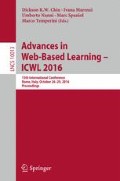Abstract
Beginning researchers in general face various difficulties when initiating a process of scientific research due to the unavailability of proper tutoring or the minimum knowledge about research methodology and, this impacts the reliability of the process, the time and the results of the research in question. The purpose of this work is to support the acquisition of scientific skills by offering to beginning researchers learning analytics in each and every one of the phases and stages of the investigative process based on the actions and interactions that teachers/supervisors, experts and researchers make during this investigative process. Therefor, it is presented, as a detailed case study, the skill of formulating research questions by defining the process that was used, including the actors, the measurements, and the indicators, the formative process and the interactions managed with the Binnproject software. Finally the K-means algorithm is used in analyzing students’ behavior and creating clusters according to their performance during the process of formulating scientific questions, this way supporting the process of determining strategies able to strengthen scientific competences for both students and the teaching practice.
Access this chapter
Tax calculation will be finalised at checkout
Purchases are for personal use only
References
Reeves, T.C.: Enhancing the Worth of Instructional Technology Research through “Design Experiments” and Other Development Research Strategies. Paper presented Annual Meeting of the American Educational Research Association, New Orleans (2000)
Pistilli, M.D., Arnold, K.E.: Course signals at Purdue: using learning analytics to increase student success. In: 2nd International Conference on Learning Analytics and Knowledge, May, pp. 2–5 (2012)
Graf, S., Ives, C., Rahman, N., Ferri, A.: AAT: a tool for accessing and analysing students’ behaviour data in learning systems. In: 1st International Conference on Learning Analytics and Knowledge, pp. 174–179 (2011)
Burkhardt, G., Gunn, C., Dawson, M., Coughlin, E.: Literacy in the digital age. Br. J. Educ. Technol. 37, 315 (2003)
Turiman, P., Omar, J., Daud, A.M., Osman, K.: Fostering the 21st century skills through scientific literacy and science process skills. Procedia Soc. Behav. Sci. 59, 110–116 (2012)
González, J., Wagenaar, R.: Una introducción a Tuning Educational Structures in Europe. La contribución de las universidades al proceso de Bolonia. Bilbao Publicaciones la Univ. Deusto, p. 96 (2009)
Beneitone, P., Gonzalez, J., Siufi, R., Wagenaar, G.: Reflexiones y perspectivas de la educación superior en América Latina. Inf. Final. Tuning—América Lat., pp. 1–432 (2004)
Tobergte, D.R., Curtis, S.: National assessment program – science literacy year 6 report. J. Chem. Inf. Model. 53(9), 1689–1699 (2013)
Gil Pérez, D., Macedo, B., Martínez, Torreglosa, J., Sigifredo, C., Valdés, C., Vilches, A.: Cómo promover el interés por la cultura científica (2005)
OECD: Pisa 2015 Draft Science Framework (2015)
Blikstein, P.: Using learning analytics to assess students’ behavior in open-ended programming tasks. Learning, October, pp. 110–116 (2011)
Worsley, M., Blikstei, P.: What’s an expert? Using learning analytics to identify emergent markers of expertise through automated speech, sentiment, and sketch analysis. Educ. Data Min. 2011, 5 (2011)
Bollier, D.: The Promise and Peril of BIG DATA
Romero, C., Ventura, S.: Educational data mining: a survey from 1995 to 2005. Expert Syst. Appl. 33(1), 135–146 (2007)
Siemens, G., Baker, R.S.J.: Learning Analytics and Educational Data Mining: Towards Communication and Collaboration (2010)
Siemens, G., Gasevic, D., Haythornthwaite, C., Dawson, S., Shum, S.B., Ferguson, R.: Open learning analytics: an integrated & modularized platform proposal to design, implement and evaluate an open platform to integrate heterogeneous learning analytics techniques (2011)
Siemens, G.: What are Learning Analytics? Pagine Web (2011)
Elias, T.: Learning analytics: definitions, processes and potential. Learning, p. 23 (2011)
Duval, E.: Learning Analytics and Educational Data Mining (2012)
Shum, S.B.: Learning analytics. J. Interact. Online Learn. Soc. Behav. 53(4), 395 (2012)
Ferguso, R., Shum, S.B.: The Open University’ s repository of research publications Social Learning Analytics: Five Approaches Conference Item Social Learning Analytics: Five Approaches (2012)
Shum, S.B., Ferguson, R.: Social learning analytics. KMi Technical Report (2011), vol. 15, June (2011), p. 2330616 (2012)
Ferguson, R., Shum, S.B.: Social Learning Analytics: Five Approaches, Open Univ.’s Repos. Res. Publ. (2012)
Fergunson, R.: Learning analytics: visions of the future. In: The “LASI Spain 2016” International Workshop is Organized by the University of Deusto (UD) with the Collaboration of SNOLA (Spanish Network of Learning Analytics) (2016)
NPA: National Postdoctoral Associate Core Competencies Self-Assessment Checklist
Shavelson, R., McDonnell, J.: What are educational indicators and indicator systems? Pract. Assessment Res. Eval. (1991)
Scheffel, M., Drachsler, H., Stoyanov, S., Spech, M.: Quality Indicators for Learning Analytics, vol. 17, pp. 124–140 (2014)
Author information
Authors and Affiliations
Corresponding author
Editor information
Editors and Affiliations
Rights and permissions
Copyright information
© 2016 Springer International Publishing AG
About this paper
Cite this paper
Salas, D.J., Baldiris, S., Fabregat, R., Graf, S. (2016). Supporting the Acquisition of Scientific Skills by the Use of Learning Analytics. In: Chiu, D., Marenzi, I., Nanni, U., Spaniol, M., Temperini, M. (eds) Advances in Web-Based Learning – ICWL 2016. ICWL 2016. Lecture Notes in Computer Science(), vol 10013. Springer, Cham. https://doi.org/10.1007/978-3-319-47440-3_32
Download citation
DOI: https://doi.org/10.1007/978-3-319-47440-3_32
Published:
Publisher Name: Springer, Cham
Print ISBN: 978-3-319-47439-7
Online ISBN: 978-3-319-47440-3
eBook Packages: Computer ScienceComputer Science (R0)

